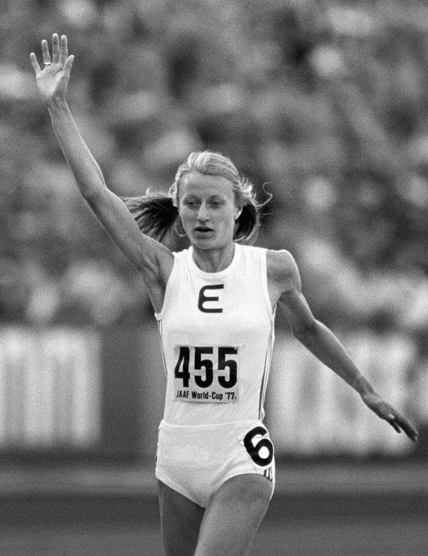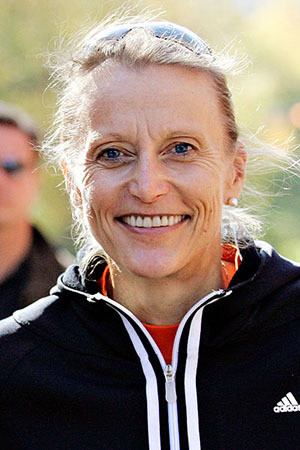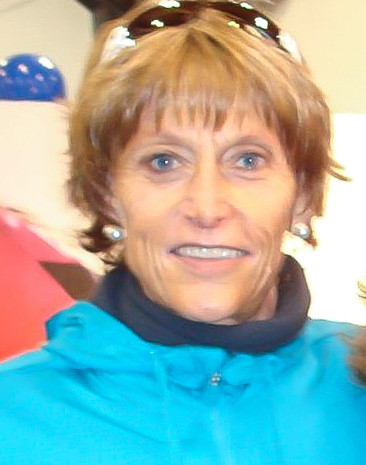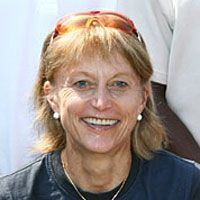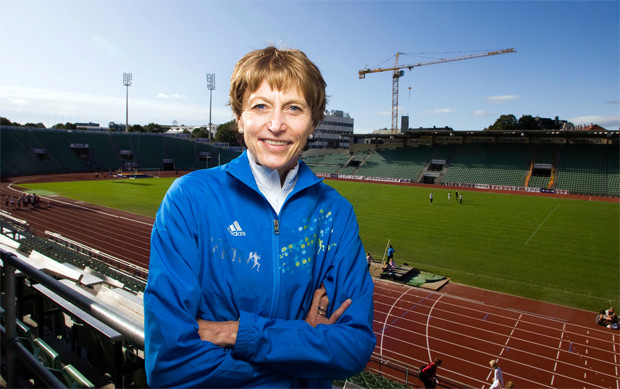Grete Waitz, Marathon Champion, Dies at 57
Grete Waitz, the Norwegian schoolteacher who won more New York City Marathons — nine — than anyone else, and whose humility and athleticism made her a singularly graceful champion and a role model for young runners, especially women, died Tuesday in Oslo. She was 57.
Her death was confirmed by Helle Aanesen, the manager of Aktiv Mot Kreft (Active Against Cancer), the foundation Waitz founded in 2007. In 2005, Waitz had received a diagnosis of cancer, though she never publicly revealed what kind. She lived in Oslo, and she and her husband, Jack, also had a home in Gainesville, Fla.
In 1991, Runner’s World magazine named Waitz the female runner of the quarter-century, and she was perhaps the pre-eminent female distance runner in history. She twice set the world record at 3,000 meters, and she set world records at distances of 8 kilometers, 10 kilometers, 15 kilometers and 10 miles.
But it was in the marathon, the 26.2-mile symbol of human endurance, that Waitz most distinguished herself, setting a world record of 2 hours 32 minutes 30 seconds the first time she ran one, in New York in 1978, and subsequently lowering the world standard three more times. In addition to her New York City victories, Waitz won the London Marathon twice, the Stockholm Marathon, once, and the world championship marathon in 1983.
“She is our sport’s towering legend,” said Mary Wittenberg, the president of the New York Road Runners. “I believe not only in New York, but around the world, marathoning is what it is today because of Grete. She was the first big-time female track runner to step up to the marathon and change the whole sport.”
Grete Waitz (whose name was pronounced GREH-tuh VITES) was not simply a champion, however; she was also something of a pioneer. At the time of her first New York victory, women’s distance running was a novelty. Just 938 out of 8,937 entrants in the 1978 New York marathon were women — in 2010, 16,253 of 45,350 entrants were — and the women’s marathon would not be added to the Olympics until the 1984 Summer Games in Los Angeles, where Waitz finished second to Joan Benoit Samuelson.
“I lost a mentor and a role model,” Samuelson, 53, said Tuesday, a day after running the Boston Marathon in 2:51:29. She decided to run at the last minute, Samuelson said, because, although she had been battling back problems, she was inspired by Waitz’s courage.
“What will endure forever is that she was able to balance a competitive career with the most gracious lifestyle, and a character that emanated goodwill,” Samuelson said.
Remarkably, Waitz, a champion track runner, ran her first marathon as a lark, with the encouragement of her husband, who was also her coach, and who told her that a trip to New York would be like a second honeymoon for them. Even in training, she had never run more than 13 miles, and the science of the sport was young enough that her dinner the night before the race included shrimp cocktail and filet mignon, hardly the load of carbohydrates that even today’s rankest amateurs know to consume. As she recalled in later interviews, the last 10 miles of the race were agony, and she was so angry at her husband that when she crossed the finish line, she tore off her shoes and flung them at him.
“I’ll never do this stupid thing again,” she yelled.
She was, however, hooked. The next year, she finished the race in 2:27:33, beating her record by almost five minutes and becoming the first woman to officially run a marathon faster than two and a half hours. Her legendary status was assured.
In her home country, her New York victories conferred on her the status of a national hero; a statue of her stands outside Bislett Stadium, an international sports arena in Oslo, and her likeness appeared on a Norwegian postage stamp. She established a 5-kilometer race in Oslo that eventually expanded to 40,000 runners, and in 2007, she started her foundation, which sponsors runners in major races and supports cancer hospitals and patient centers.
“I am convinced you can go through a lot more when you are physically fit,” Waitz said to explain her foundation’s philosophy. “It is both physical and mental. With the athletic background, you think more on the positive side — you can do this.”
But she was also lionized in this country, and especially in New York, and the image of her on the road — a quick, efficient stride, her pigtails slicing back and forth like metronomic windshield wipers — became familiar.
She won her victories as the popularity of the New York marathon itself surged, and she became a celebrity in the city. Cabdrivers and the homeless called her by her first name, and over the years, she and her husband made appearances not only at the marathon but also at other New York events, including Grete’s Great Gallop.
Working with the New York Road Runners Foundation, she frequently spoke to the city’s schoolchildren, and she often appeared on behalf of Fred’s Team, the cancer charity started by her friend Fred Lebow, the founder of the New York marathon, who died of the disease in 1994.
“Every sport should have a true champion like Grete, a woman with such dignity and humanity and modesty,” said George Hirsch, the chairman of the New York Road Runners. “She symbolized what was so great about the community of marathoners.”
Grete Andersen was born in Oslo on Oct. 1, 1953. Her father, John, was a pharmacist; her mother, Reidun, worked in a grocery store. From an early age, she would run with her two older brothers, Jan and Arild, in a nearby forest and later at a local track club. She met Jack Waitz, a local track coach and an accountant for a newspaper, through mutual friends.
She is survived by her brothers and her husband.
Waitz was in her mid-20s, a geography teacher in the Oslo schools, and the oldest woman on the Norwegian national track team when the invitation to participate in the marathon came from Lebow. She had, in fact, been planning to retire from running after the 1978 track season to concentrate on teaching. But Lebow, who knew of her accomplishments, was a savvy judge of running talent, and he and her husband believed she had longer distances in her. At the very least, Lebow thought, Waitz would be an excellent pacesetter.
She outdid his expectations, of course, and they became fast friends and the co-authors of one of running’s most memorable episodes. She had already run her last New York City Marathon as a competitor in 1990, when she finished fourth, but in 1992, while Lebow’s brain cancer was in remission, Waitz and Lebow ran his race together. Their time was 5:32:35, an agonizingly long, slow pace for Waitz, who was used to running more than twice as fast.
“It was an incredibly emotional day for both of us,” Waitz later said. “He gave me the strength to run, but it was very hard to run so slowly with him for more than five hours.”
They finished with their hands clasped and raised over their heads. She would always call it her 10th victory in New York.
“I always say she’s the queen of the road,” Lebow said about Waitz before the race. “But she doesn’t behave like a monarch.”
ADVERTISEMENT
BY
Looking for more information?
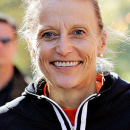
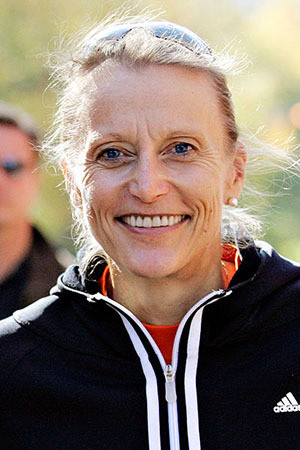
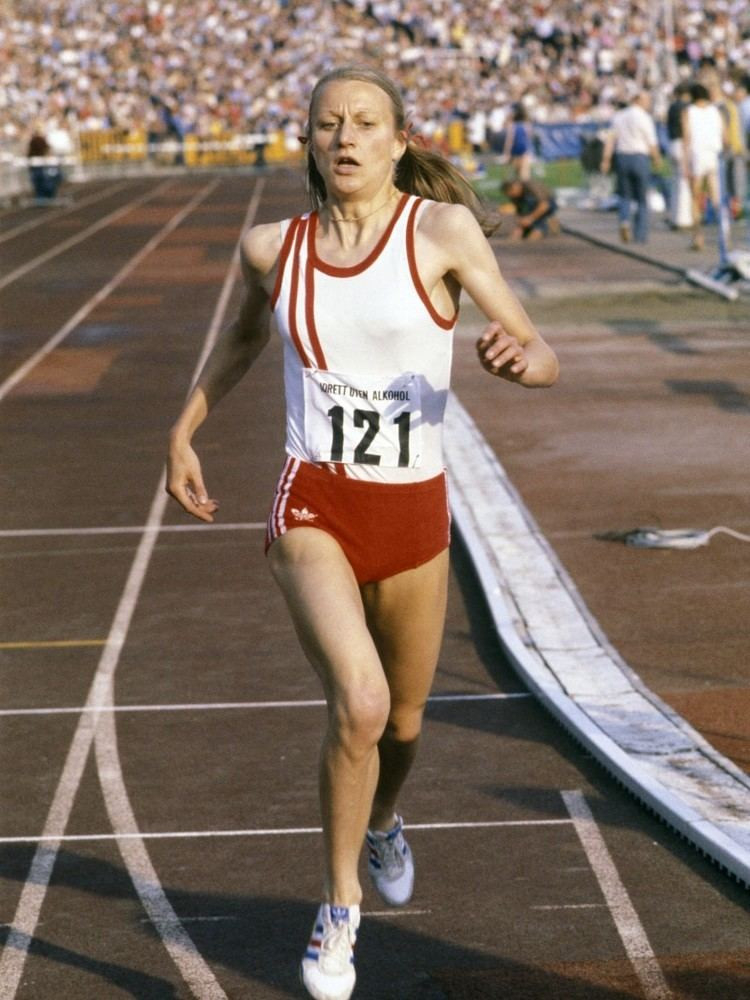
 Amanda S. Stevenson
Amanda S. Stevenson 